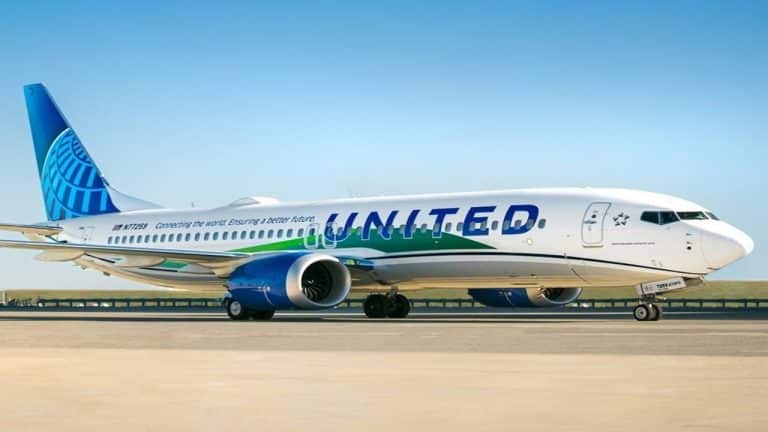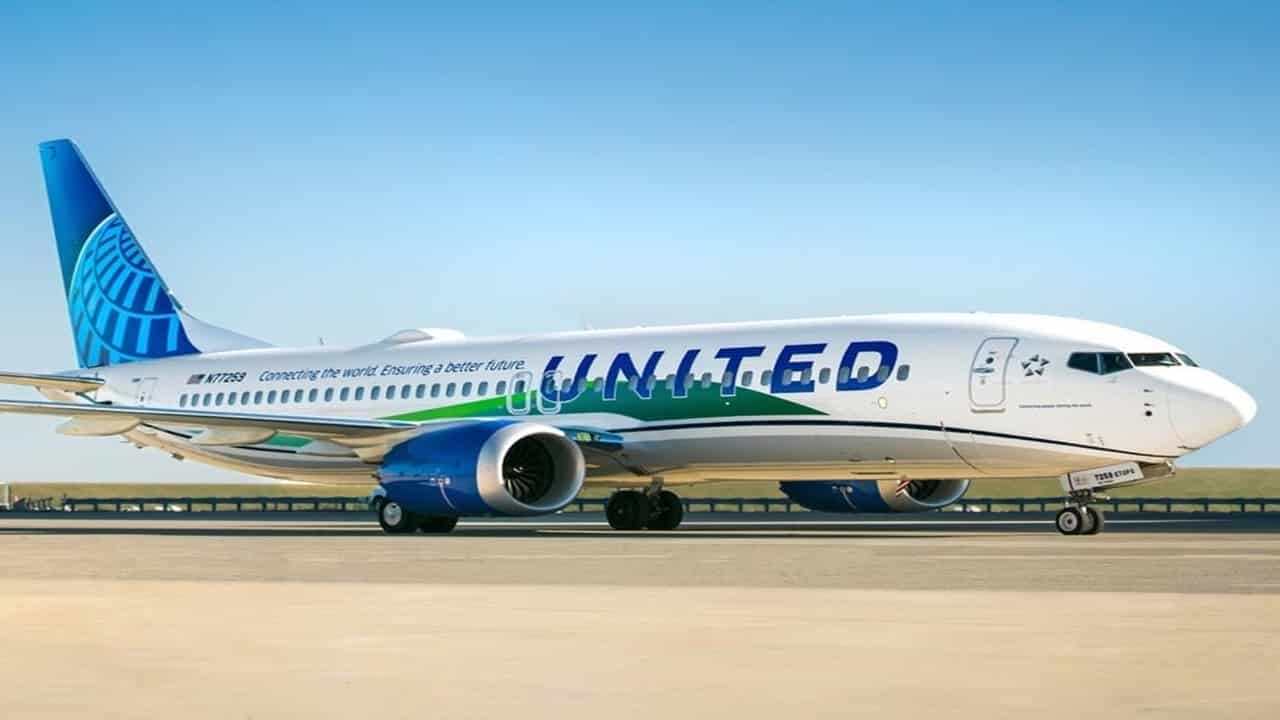
United Airlines: First passenger flight with 100% sustainable aviation fuel-powered engine
United Airlines announced that the first passenger flight with 100% sustainable aviation fuel (SAF) has been completed. It was the Boeing 737 MAX 8 from Chicago’s O’Hare International Airport to Washington, D.C.’s Reagan National Airport and it took place on December 1, using 100% SAF in the right engine, and traditional jet fuel in the left.
Sustainable aviation fuel is produced from sustainable resources, such as waste oils, agricultural residues, and also carbon captured from the air, rather than from fossil fuels. Nowadays, airlines are allowed to use a maximum of 50% (SAF) of total flights fuel. Nevertheless, United Airlines obtained a particular permission to operate an entire engine only with SAF. As a result, this engine generated an estimated 75% less CO2 emissions than conventional jet fuel-powered flight. This is an outstanding result in one of the main carbon-intensive sectors.
Regarding the main participants of this initiative, some of the most important players in the industry are involved. United partnered on the flight with Boeing, GE and Safran Engines joint venture CFM International, Marathon Petroleum subsidiary Virent, and SAF producer World Energy. Ihssane Mounir, Senior Vice President of Sales and Marketing for The Boeing Company, stressed how proud Boeing is to be part of this success, as collaborations and partnerships are the only way to ensure sustainable aviation for the future.
The project is aligned with the general mission of United Airlines, increasingly focused on sustainable goals. In fact, the flight is coherent with the company’s plans to fully reduce greenhouse gas emissions by 2050 without relying on carbon offsets. Considering other initiatives in the sustainable field, the company made an order of 15 net zero carbon aircraft from Boom Supersonic, and an investment in aeronautical company Vertical Aerospace for the development of a zero-carbon, electric vertical takeoff and landing (eVTOL) aircraft. Moreover, United launched the Eco-Skies Alliance, a program aimed to give corporate customers the opportunity to reduce the travelling environmental impact beyond purchasing offsets, by paying the additional cost of SAF.
This flight has been a significant success for the entire aviation industry and its path to sustainable solutions. In recent years, air transport has undergone strong pressures since it is one of the main contributors to GHG emissions, accounting for an estimated 2% of global GHG emissions. SAF is one of the key tools for the industry to address its climate impact since it generates significantly lower lifecycle carbon emissions than conventional jet fuel. More work needs to be done to develop affordable, energy-dense, low-carbon fuels at scale to enable air connections to be made in a sustainable manner. Nevertheless, this is an important milestone for the aviation sector, not only one of the most important fields for the economy, but also one of the most complex to turn into zero-carbon emissions.
Sources:
Author: Marianna Cacace
United Airlines: First passenger flight with 100% sustainable aviation fuel-powered engine
United Airlines announced that the first passenger flight with 100% sustainable aviation fuel (SAF) has been completed. It was the Boeing 737 MAX 8 from Chicago’s O’Hare International Airport to Washington, D.C.’s Reagan National Airport and it took place on December 1, using 100% SAF in the right engine, and traditional jet fuel in the left.
Sustainable aviation fuel is produced from sustainable resources, such as waste oils, agricultural residues, and also carbon captured from the air, rather than from fossil fuels. Nowadays, airlines are allowed to use a maximum of 50% (SAF) of total flights fuel. Nevertheless, United Airlines obtained a particular permission to operate an entire engine only with SAF. As a result, this engine generated an estimated 75% less CO2 emissions than conventional jet fuel-powered flight. This is an outstanding result in one of the main carbon-intensive sectors.
Regarding the main participants of this initiative, some of the most important players in the industry are involved. United partnered on the flight with Boeing, GE and Safran Engines joint venture CFM International, Marathon Petroleum subsidiary Virent, and SAF producer World Energy. Ihssane Mounir, Senior Vice President of Sales and Marketing for The Boeing Company, stressed how proud Boeing is to be part of this success, as collaborations and partnerships are the only way to ensure sustainable aviation for the future.
The project is aligned with the general mission of United Airlines, increasingly focused on sustainable goals. In fact, the flight is coherent with the company’s plans to fully reduce greenhouse gas emissions by 2050 without relying on carbon offsets. Considering other initiatives in the sustainable field, the company made an order of 15 net zero carbon aircraft from Boom Supersonic, and an investment in aeronautical company Vertical Aerospace for the development of a zero-carbon, electric vertical takeoff and landing (eVTOL) aircraft. Moreover, United launched the Eco-Skies Alliance, a program aimed to give corporate customers the opportunity to reduce the travelling environmental impact beyond purchasing offsets, by paying the additional cost of SAF.
This flight has been a significant success for the entire aviation industry and its path to sustainable solutions. In recent years, air transport has undergone strong pressures since it is one of the main contributors to GHG emissions, accounting for an estimated 2% of global GHG emissions. SAF is one of the key tools for the industry to address its climate impact since it generates significantly lower lifecycle carbon emissions than conventional jet fuel. More work needs to be done to develop affordable, energy-dense, low-carbon fuels at scale to enable air connections to be made in a sustainable manner. Nevertheless, this is an important milestone for the aviation sector, not only one of the most important fields for the economy, but also one of the most complex to turn into zero-carbon emissions.
Sources:
Author: Marianna Cacace
RELATED
Regulatory Developments in ESG Reporting and Their Implications for Businesses
The focus on Environmental, Social, and Governance (ESG) factors has surged, leading to significant regulatory changes worldwide. Key developments include the EU’s Corporate Sustainability Reporting Directive (CSRD), the US SEC’s...
Read MoreThe Earthshot Prize 2022
The Earthshot Prize 2022 The Earthshot prize is an award given to five winners that created some projects that could help our planet face some of the most important challenges...
Read More

